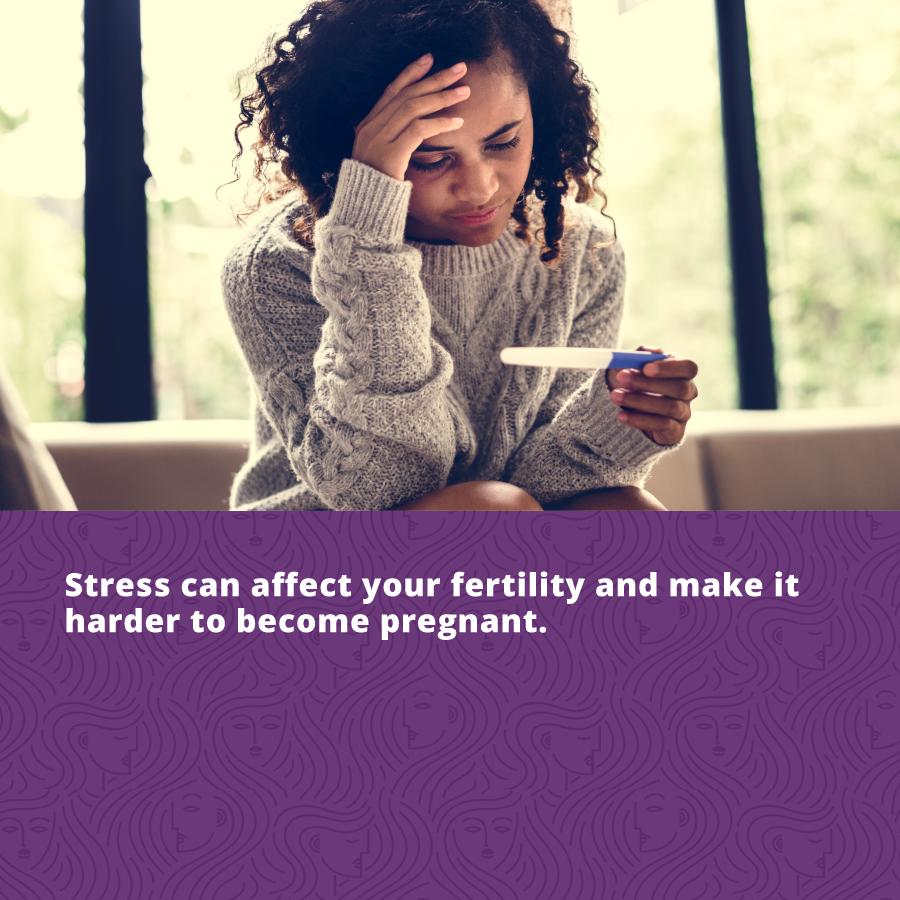How Stress Affects Women’s Health
Stress affects women’s health in so many unexpected ways. Stress comes in all shapes and sizes and to various degrees: drivers who don’t use their turn signal, kids throwing temper-tantrums, an overloaded (and ever-growing) inbox – just to name a few. With that said, the same experiences that stress you out may roll off someone else’s back.

Stress isn’t always a bad thing though. When reacting to an immediate threat, acute stress triggers the release of cortisol and adrenaline, which prepares the body to face a threat or flee from it. Some people do well under pressure and need to light a little fire in order to get moving. But a little flame can quickly turn into a wildfire that destroys everything in its path.
Chronic stress, brought on by social, financial, or emotional situations, can cause serious damage. Those same chemicals that in short bursts can save your life now suppress functions you don’t need for immediate survival, altering the mind and body.
For example, in one study of 647 women, researchers measured subjects’ stress hormones and telomere length. Telomeres are bundles at the end of chromosomes, which shorten each time the cell divides. Shorter telomeres link to a slew of age-related diseases, and once they become too short, they no longer divide or die off. The test showed that those who had above-average stress levels had slightly shorter telomeres (or DNA “youth caps”) compared to low-stress sisters. In this group, telomere length was impacted similarly to the effects of obesity, smoking, or 10 years of aging!
We’re all equipped to manage stress, but the ways that we react to it are different. Take this past year for example. Due to the chaos and ever-changing, unpredictable nature of 2020, the American Psychological Association has stated that due to stress “We are facing a national mental health crisis that could yield serious health and social consequences for years to come.”
Here are a Few Ways Stress Affects Women’s Health
Stress Steals Your Sleep
Still counting sheep? Chronic stress can cause hyperarousal, a physiological state that upsets the balance between sleep and wakefulness and makes it hard to fall and stay asleep. Stress-related sleep disruptions can lead to many different health problems and even compound stress!
Stress Makes You Scatterbrained
Stress affects women’s health both mentally and physically. You may be unable to focus or think straight, either at work or home. You also may find it harder to learn and retain new information; studies have linked long-term exposure to high cortisol with a shrinking of the hippocampus, the brain’s memory center. It can also cause headaches and migraines which impair vision and your ability to focus.
Stress Makes You Crave Bad Food
Stressed and suddenly craving a burger? No, it doesn’t sound crazy. Along with insulin, cortisol and other hormones appear to be responsible for stress-related cravings for salt, sugar, and fat. This, of course, can lead to overeating and weight gain as women are more prone to stress-related weight gain than men.
Stress Messes With Blood Sugar
People with type 2 diabetes may find that their blood sugar is higher when they’re stressed out. (Physical stresses, such as illness or injury, can raise blood sugar levels, too.)
Stress Causes Or Worsens Back Pain
When you feel like you’re under siege, every muscle in your body clenches up, including those in your neck and back. If you’re stressed all the time and those muscles stay tight, it can eventually cause major pain and lack of mobility.
Stress Puts Your Heart at Risk
Under stress, the body releases inflammatory substances into the bloodstream, which can aggravate heart disease or increase the risk of heart attack or stroke. Also, under chronic stress, you may smoke, overeat, and stop working out – unhealthy behaviors that jack up the risk for blood pressure, high cholesterol levels, and heart disease.

Stress Affects Fertility
Stress can also affect your fertility and make it harder to become pregnant. Many of the symptoms above make it harder to become pregnant, but stress also influences your hormones. One study found that women whose saliva had high levels of an enzyme that marks stress took 29% longer to conceive compared to those who had less. Stress can also negatively impact your sex drive.
Everyone has varying levels of stress, and everyone manages it to varying levels of “success”. Interestingly, the way we view stress can affect the toll it takes on our bodies. For example, if you view a physical manifestation of stress, such as your hands shaking, as a loss of control rather than reassuring yourself that you are a strong and resilient woman and that this is just your body energizing you to overcome stress, it can make stress worse.
No one wants stress, but it’s an unavoidable part of life. When viewed as a negative and harmful phenomenon, it will become one. Stress affects women’s health like a landslide. If these symptoms of stress seem all too relatable, stay tuned for our next blog post on identifying your personal triggers and managing them in a healthful, holistic way.

